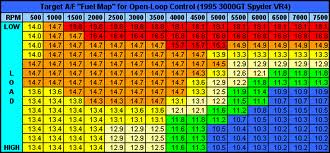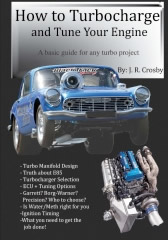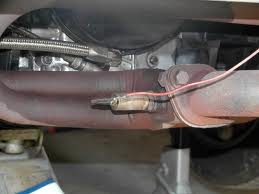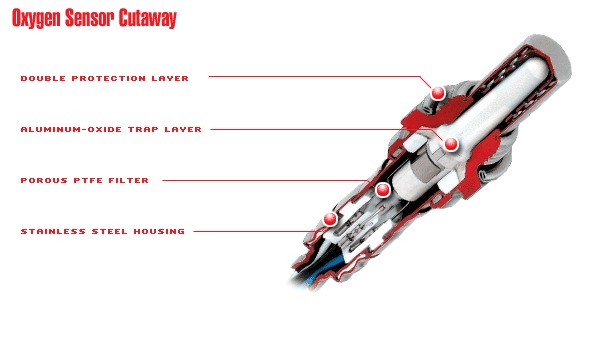| What's Hot! | Products/ Tools | EFI Tuning | Basic Tuning | Advanced Tuning | Chassis Tuning | Advertise with us |
What is Closed loop vs. Open Loop o2?
How to tune and set these parameters
Contributed by: Enginebasics.com

A term you are bound to run across when tuning an EFI fuel injection set-up, is the term “closed loop o2”. The purpose of this article is to explain how open and closed loop o2 works and how to tune and modify these tables.
O2 Sensor Background
The o2 sensor is the sensor located just after the exhaust manifold where all of the exhaust gasses have been collected into a single exhaust pipe. This way the sensor can get an accurate reading from all cylinders of the motor. There are two types of o2 sensors, narrow band, and wide band. While closed loop o2 can be used with a narrow band sensor, its accuracy is not fine enough to consistently rely on its reading. For this reason I would suggest only using closed loop o2 with a wideband o2 sensor. To be fair though, I would suggest that any high performance engine be equipped with a wide-band o2 sensor, and that this should be considered a must have. This sensor is a 0-5v sensor that can accurately read the air to fuel ratio of the exhaust gasses.
Defining Open Loop and Closed Loop o2
Open loop is when the ECU is not referring to the o2 sensor for feedback. Meaning that the o2 sensor might as well not be there, because the ECU is not using it to modify its timing and fuel maps. If your asking yourself why the ECU would ever want to do this? It is because there are times when you want the motor to run a set amount of timing and fuel, no matter what the conditions. For reference, most OEM cars are tuned to run closed loop o2 on partial throttle driving to get the best gas mileage, and then run open loop on wide open throttle (WOT) to be sure the motor runs the safest it can, and that the factory fuel map is not modified in any way. Closed loop is when the ECU does refer to the o2 sensor for feedback. Using the o2 sensor the ECU will modify its fuel table based on the readings the o2 sensor is seeing. This is important in maintaining a perfect A/F ratio as there are so many variables affecting the tune of a motor at any given time. For example, air temperature, altitude, humidity, and so on.
Tuning Closed loop o2
Most stock and aftermarket ECU’s allow you to tune the adjustability of closed loop o2 operation. If you have hacked into the stock ECU to change calibrations then this might be more difficult to tune, but on most aftermarket ECU’s it is very straight forward. Some of the options you will have the ability to change are:
1. The Percent (%) of fuel that can be added or subtracted from the fuel map.
2. The coolant temperature when closed loop o2 will begin.
3. The engine RPM when closed loop o2 will begin.
4. Conditions when closed loop o2 should be turned off.
5. The target A/F value based on load or MAF cfm, and engine speed.

Certain ECU’s allow for more or less tuning of this parameter. It should be pretty straight forward what each of these values do. One thing you will want to make sure you do is TURN OFF CLOSED LOOP O2 when you are starting out tuning the vehicle. This is because as you are trying to get a good base fuel map, you will want to see the actual A/F value’s your map is producing. If you leave o2 feedback on, then you will be seeing modified values, as the ECU itself is trying to dial in your target A/F ratio. Once you have fully tuned the fuel map to be as close as you can to your target A/F values, then you will want turn on closed loop o2. You will notice the map to contain even smoother A/F ratios, and be spot on now that the ECU is adding a little here, and taking away some there, to provide the perfect tune.
Conclusion
Some tuners or users are scared of o2 feedback, because of the ability of the car to lean itself out. While this is a possibility, most tuners can tune the stock fuel map to be so close to accurate, that they only allow closed loop o2 to modify at max 10% of the fuel map. Also, if the user is worried about the o2 sensor going bad, and giving false readings, I often encourage them to just change out the o2 sensor every 3-5 years just as a precaution. When wideband sensors have become as cheap as $80 bucks, it just seems like a sound investment when there can be upwards of thousands of dollars under the hood.
Please make sure your wideband o2 controller is up to date and the sensor is reading properly. Here are some current ones on the market:
If you have any additional comments or questions on this article or any other article found on enginebasics.com, please contact us and we will get back to you.
ATTENTION READER:
If you enjoyed the information and article you just read be sure to check out our newly released book with even more exciting photo's and information:How to Turbocharge and Tune your Engine

Want to know more about your particular Make and Model vehicle? All of these vehicles are covered in the tech, maintenance and repair articles found above. Enginebasics is the wiki or wikipedia of car part, repair, how to and tuning information. Let us be the class 101 for your automotive learning.
| Ford | General Motors GM | Pontiac | Jaguar | Land Rover | Nissan |
| Toyota | Honda | Lexus | Acura | Lotus | Scion |
| Infinity | BMW | Mercedes | Mitsubishi | Ferrari | Maserati |
| Lamborghini | Volks Wagen VW | Saab | Audi | Hyundai | Kia |
| Subaru | Mazda | Chevy | Volvo | Caddilac | Dodge |
| Chrylser | Daewoo | Porsche | Mercury | Freightliner | MG |
Individual Models
| Ford Mustang | Mitsubishi Eclipse | Mitsubishi Evo | Subaru WRX / STI | Dodge Viper | Chevrolet Corvette |
| Nissan Skyline | Honda S2000 | Nissan 350z | Toyota Supra | Chevy Camaro | Lotus Elise Exige |
| Honda Civic | VW Golf | Dodge SRT-4 | Eagle Talon | Acura Integra | BMW M3 |
| Nissan 240sx | Porsche 911 | Acura NSX | Honda Accord | Toyota Camry | Toyota MR2 |
| VW R32 | Dodge Truck | Mazda Rx7 | VW Jetta | Sand Buggy | Nissan Sentra |
For the latest Automotive news and stories visit the websites below |
Our feature Build: An AWD V6 Civic






